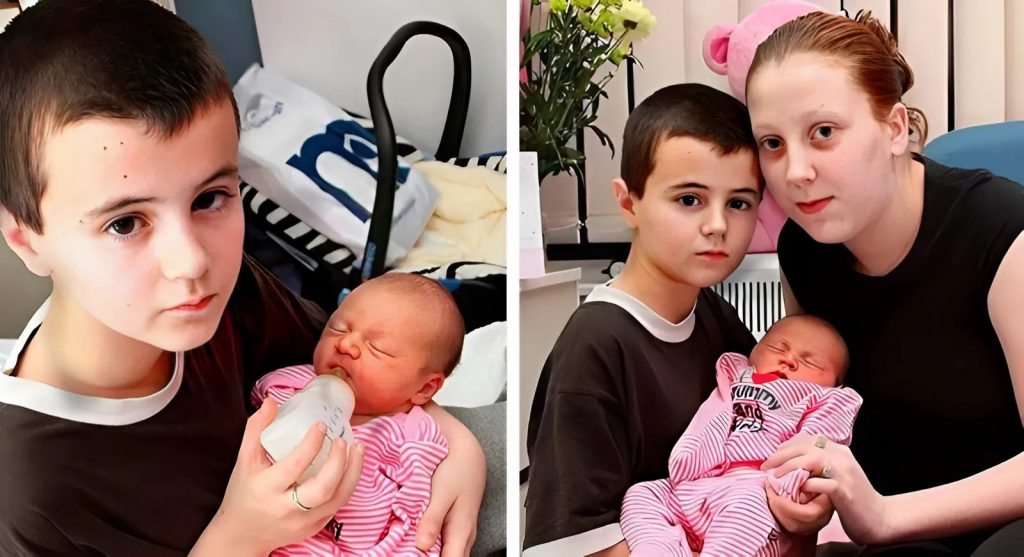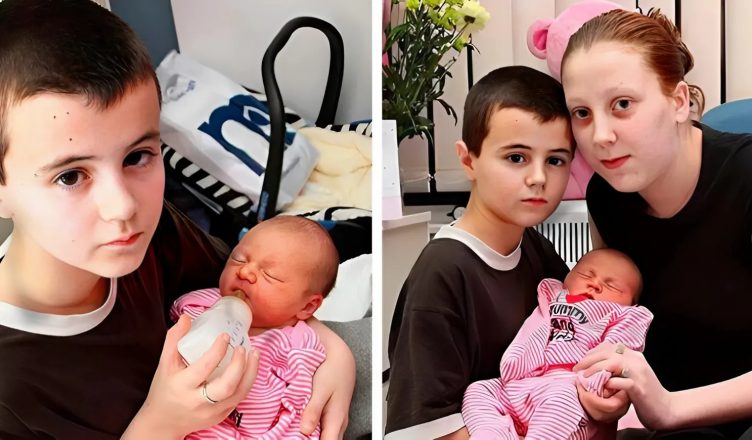In early 2009, a photograph made headlines across the United Kingdom. It showed a 13-year-old boy, still soft-faced and wide-eyed, sitting beside a 15-year-old girl on a hospital bed. In her arms was a newborn baby, swaddled in a white blanket. The boy was Alfie Patten. The girl, Chantelle Stedman. And the infant? Their daughter, they claimed — Macy Roxanne.
That image quickly became one of the most widely circulated tabloid photos of the decade. The media dubbed Alfie the youngest father in the UK. The story ignited fierce national debate — about morality, parenting, education, and responsibility. But behind the frenzy, behind the sensationalism, were real people — confused, vulnerable, and suddenly exposed to the world.
The Early Storm
Alfie, just barely a teenager, spoke shyly in interviews. He said he wanted to be there for his daughter, to feed her, to change nappies, to be called “dad.” He meant it. Or at least, he thought he did. At that age, the boundary between intention and reality is often blurry.
Chantelle, slightly older, seemed overwhelmed but determined. Her face — tired and pale — bore the weight of sudden adulthood. For a moment, they were a family. Fragile, unformed, but sincere.
Society responded with fascination, concern, and judgment. Talk shows dissected their lives. Politicians used their story as a platform for reform. Millions of people who had never met Alfie or Chantelle formed opinions about them based solely on a photograph and a headline.
A DNA Test Changes Everything
Within weeks, everything changed. A DNA test, mandated by social services, revealed that Alfie was not the baby’s father. The media, once eager to praise his innocence, turned on him with cruelty. He became the butt of national jokes. His picture was used in satirical sketches. Internet forums mocked his naivety.
For a 13-year-old boy, the consequences were devastating. He became a symbol — first of scandal, then of shame. He had been sincere in his belief, sincere in his desire to do the right thing. But now, he was seen as foolish. Or worse, dishonest.

Alfie retreated from public life. The headlines faded. But their impact lingered.
Growing Up in the Shadows
Alfie spent his teenage years away from the public eye. He avoided social media, declined interviews, and tried to live quietly. Those who knew him say he was never the same boy after 2009.
He left school early. The attention had made normal life impossible. He struggled with identity, with trust, with the burden of being known for something he never fully understood.
Today, Alfie is nearing thirty. According to local reports, he works in construction, keeps a low profile, and avoids anything that might bring the past back into view. He is not bitter, those close to him say — but he is guarded. He has learned that the world can be both curious and cruel.
And What About Chantelle?
Chantelle was left to raise Macy on her own. She bore the brunt of the public’s judgment. For years, she was labeled — sometimes cruelly — as a cautionary tale. But she persevered.
She finished school through night classes, found stable employment, and did everything she could to shield her daughter from the weight of the past.
Today, Macy is almost the same age her mother was when she was born. She’s described as smart, quiet, and kind — a teenager who’s aware of the headlines that surrounded her birth, but not defined by them. Chantelle never let the public’s scrutiny dictate her child’s story.
More Than a Headline
Sixteen years is a long time. Long enough for stories to fade. Long enough for a young mother to become a strong woman. Long enough for a boy to become a man who knows what it’s like to be misunderstood.
The photograph remains. It still surfaces online, still generates curiosity. But the people in it have moved on. They are no longer the caricatures created by tabloids. They are no longer children.
Alfie wasn’t the father. But he was a child thrust into adult chaos. He made mistakes, yes. But so did the world around him — by exploiting, judging, and forgetting that behind every scandal is a human being just trying to understand life.
Sixteen years later, what remains isn’t just a photo.
It’s a reminder that real lives don’t fit neatly into headlines.
That growing up is never simple.
And that the hardest lessons come when the cameras are gone.
